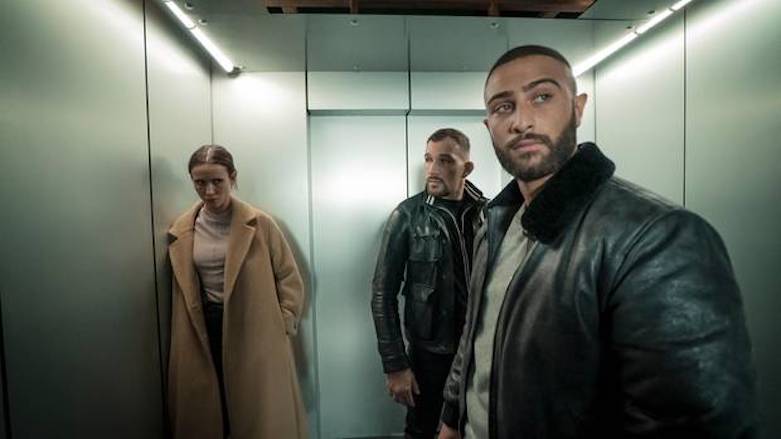New Netflix production highlights Germany’s Kurdish hip-hop scene and identity

ERBIL (Kurdistan 24) – “Skylines,” a new Netflix drama released in September, is the first big Netflix production that sheds light on Germany’s Kurdish hip-hop scene and Kurdish identity abroad.
Kurdistan 24 spoke with the Kurdish filmmaker, 32-year-old Soleen Yusef, who said “Skylines” is her first Netflix production.
The series has already received positive feedback from the German media. Germany’s Neon Magazine wrote that the series was “too good to be from Germany.”
“They decided to open Netflix in Europe and created an office in Amsterdam and also an office in Berlin, Germany. And this is one of the Netflix productions for Germany,” Yusef said.
The 32-year-old had previously produced series for German and Austrian TV. “Netflix is the third series I am doing, but it’s the first time working for Netflix.”
Yusef, born in the Kurdistan Region’s Duhok province, studied film directing and writing in southern Germany.
Her family fled the Kurdistan Region in 1996 and have lived in Germany for 22 years. “I grew up here, but my childhood was in Kurdistan,” she said.
Yusef describes herself as a free filmmaker and, more importantly, a Kurdish filmmaker.
“I like to write my own stories and do my own Kurdish film making. My red line in film making is that I stick to my own style.”
Yusef has received awards at many festivals in the past and says she is very passionate about her Kurdish identity.

“Skylines” was inspired by Kurdish hip-hop artists in Germany, such as Haftbefehl, Azad, and Xatar. “They had a big influence on the German hip-hop and rap scene. The most important and famous rap artists in Germany are Kurdish,” she said.
The story itself revolves around a hip-hop artist who produces beats, and a fictional rapper called Khalifa.
“He is somehow a mixture between Azad and Haftbefehl. We got inspired by these two Kurdish hip-hop artists. The main characters in the movie also have a Kurdish background. The good guy, and also the bad guy,” Yusef told Kurdistan 24.
Yusef underlined the importance of introducing Kurdish rappers to the German public since only Turkish or Lebanese artists are better known.
"Skylines," @Netflix' new drama series, is now available for streaming. Germany-based Soleen Yusef from the Kurdistan Region is the director. German-Kurdish rappers Azad, Haftbefehl, and others contribute to the soundtrack and have cameos in the series. pic.twitter.com/XkkuGva3DI
— Polla Garmiany ☀️ (@PollaGarmiany) September 27, 2019
Rosa Burç, a Ph.D. researcher at the Center on Social Movement Studies (COSMOS) at Scuola Normale Superiore in Florence, Italy, said there had been a recent rise in Kurdish rappers in Germany who explicitly identify as Kurds.
“It is very interesting that while these artists identify as Kurdish, there is actually never a very specific regional focus,” Burç told Kurdistan 24.
Most of these Kurdish stars are from different parts of the Greater Kurdistan, but “address a unified Kurdish identity,” she said, “and they have become quite significant figures in Germany's rap scene.”
Burç said the success of Kurdish rap artists has led to a greater acceptance of Kurdish identity.
“Azad, for instance, has become a landmark, who openly identifies as Kurdish and addresses atrocities against Kurdish people from Halabja to Kobane in his songs.”
Moreover, she added that this is the first time a Kurdish female director living in the diaspora has produced a series for Netflix, where the Kurdish diaspora identity in Germany is the focal point.
“It’s something unique. This is the first Netflix production where we can see Kurdish identity represented with language, cultural codes, traditional music, and authentic names. Something that has been widely ignored in previous productions on diaspora communities in Germany,” Burç told Kurdistan 24.
She reminded that the Kurdish language has been banned or criminalized in places, such as Turkey.
“You can see that Kurdish actors in the series use their Kurmanji mother tongue to communicate. This is very unique. There is no other Netflix production that promotes Kurdish in such a way.”
As a result of this production, the Kurds, who have been marginalized and mostly ignored as part of Germany’s migrated communities, have been given a voice in a big production such as Netflix, Burç added.
“Soleen Yusef has mastered placing Kurdish identity in the landscape of German film. By telling the story of Frankfurt’s hip-hop scene she has, in fact, revealed the multifold struggles that accompany Kurds in both their homelands and diaspora.”
After making its debut, Netflix decided not to renew the series for another season.
Editing by Karzan Sulaivany
